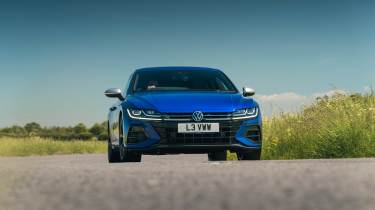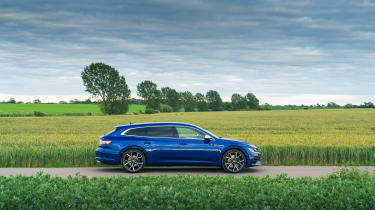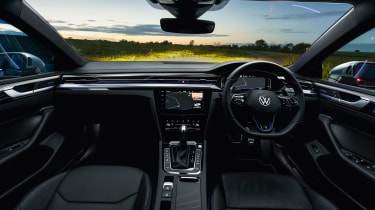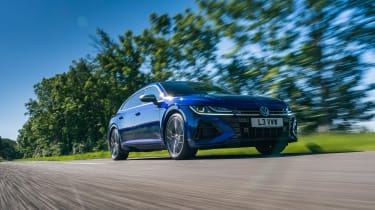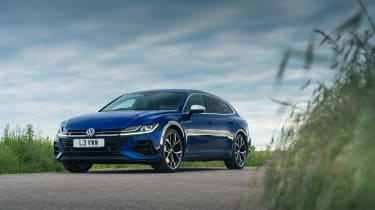Volkswagen Arteon R 2022 review – is it as appealing as the BMW M340i?
The Arteon R exploits its Golf R underpinnings well, but it’s just too expensive against more substantial rivals
You could be forgiven for being a little overwhelmed by the sheer number of new R models Volkswagen has introduced in the last few years. Joining the usual Golf has been a new Tiguan R, Golf R Estate, plug-in hybrid Touareg R and now there’s this – the Arteon R. Launched as both the fastback and this even more rakish Shooting Brake, it’s a model that VW is hoping will steal customers away from high performance premium rivals like the BMW M340i and Audi S4, two cars it will need to outperform as it’s more expensive than both its premium rivals at £56,600.
Being an adoptee of VW’s MQB platform, the Arteon R Shooting Brake essentially hotfoots the Golf R’s powertrain into a larger estate body, then adds just enough R-specific design elements to keep it distinctive, but without trying too hard. That said, the visual change is remarkably effective, with fellow road users often craning their necks just to catch a glimpse of its sleek silhouette – and this, remember, is still a VW estate.
On further inspection you can see why, as there are few ‘normal’ cars that look more exotic. The R is no wider and only 20mm lower than a standard Arteon, but the slinky windowline and scowling face stand out in the humdrum carscape of 2021. The detailing plays a strong supporting role, too – the frameless glass doesn’t just look neat when the doors are open, but also cleans up the side profile (ever wondered why a five-door Mini looks so much worse than a three-door? Look at the door seals), while the clamshell bonnet highlights the precision of the shutlines and the crispness of the surfacing. It’s all superbly executed.
This attention to detail doesn’t quite translate to the cabin, though, with the Arteon’s Passat-based dash remaining largely unchanged save for some new air vents, fake stitching and woven metal inserts. Yet while it might initially feel a little old-hat in comparison to the newer layouts seen on Golfs, Leons and Octavias launched in the last 24 months, build quality generally feels good, and annoying haptic steering wheel controls aside, the touchpoints are good too. The digital interfaces aren’t exactly brilliant, mind, but they are easier to interact with than the new-generation units wreaking havoc in the Golf 8.
More reviews
Which is a theme that seems to continue with the Arteon’s driving experience. The powertrain is also a familiar one: under the bonnet is the same transversely mounted ‘evo4’ EA888 turbocharged 2-litre four-cylinder petrol unit as in the Golf, producing 316bhp from 5350 to 6500rpm and 310lb ft of torque between 2000 and 5350rpm. This is matched to a seven-speed dual-clutch transmission and 4Motion all-wheel drive system, complete with the new torque-vectoring differential on the rear axle. The coil-spring suspension is 20mm lower than on other Shooting Brakes, with excellent multi-stage adaptive dampers standard fit, as is an uprated brake package. Larger, 20-inch alloys that are unique to the R are optional (more familiar 19s are standard), but general equipment is good, which you’d expect for the price-point.
On the road the Arteon R does a decent job of being a calm cruiser, albeit with a slightly brittle ride in its default Comfort mode on our test car’s 20-inch wheels. The different driver modes do make a difference, though, not so much improving the ride quality but making it more cohesive with the rest of the driving package. Hit the little blue ‘R’ section of the steering wheel (by accident or otherwise) and the R will instantly tense up, the firmness associated with those 20-inch rims now syncing with the more resolute tightness to the damping. The transmission is also now more willing to give you access to the strong, torquey engine, and the gearshifts are faster too.
It’s now that the ingredients start to mesh. The steering doesn’t purvey much in the way of feel, but it is accurate, and after some acclimatisation to the variable ratio is a good ally to start exploring the grip available from the front axle. Lean on the front end and you quickly discover it has more bite than a Golf R, something that could be explained by the fitment of Pirelli P Zero rubber rather than the Golf’s Goodyear Eagle F1s. Push harder still and the Arteon also does a good job of hiding its 1793kg in the corners, although in a straight line the extra 242kg over the Golf has a more noticeable effect, the Arteon lacking a real edge to its acceleration. A 0-62mph time of 4.9sec (0.2sec behind the Golf) sounds impressive in isolation, but the Arteon R never feels more than merely brisk.
With the nose locked into a bend, get on the power early and the rear differential will only just about make an impact, but there’s never quite the grunt to get it moving around with any real attitude. In less grippy conditions, however, the Arteon can be provoked into being surprisingly tail-happy in a progressive and not at all intimidating way. We’re not talking about lock-stop levels of angle, but enough to make it more engaging when circumstances allow.
But the Arteon’s appeal, unlike the Golf R that’s proven to be a disappointment for us thus far, perhaps shouldn’t be judged on a basis of no-compromise thrills, as fundamentally this is an estate car with duties beyond those of a hot hatchback. As a performance estate it’s a curious package, but one whose appeal is probably pinned more upon its aesthetics than the driving experience
Prices and rivals
Look at the Arteon R Shooting Brake in context of its rivals and you’ll see how quickly any rationalisation for it is eroded. The £56,455 BMW M340i is cheaper, more powerful, more engaging, comes with a substantially more modern interior and uses less fuel. If fuel use is still a bit strong, the M340d is also available, trading a little bit of its handling balance and top-end grunt for even more shove down low and some very impressive MPG figures. The Audi S4 TDI is also available, and costs from just £49,370 – a relative bargain against the ‘people’s car’ Arteon R, building a case against the sleek estate that just can’t be justified, even if its aesthetics have won you over.
Specs
| Engine | In-line 4-cyl, 1984cc, turbo |
| Power | 316bhp @ 5350-6500rpm |
| Torque | 310lb ft @ 2000-5350rpm |
| Weight | 1793kg (179bhp/ton) |
| 0-62mph | 4.9sec |
| Top speed | 155mph (limited) |
| Basic price | £56,600 |
The following review was first published in evo 289. To purchase the latest issue or subscribe, head over to our online shop here

